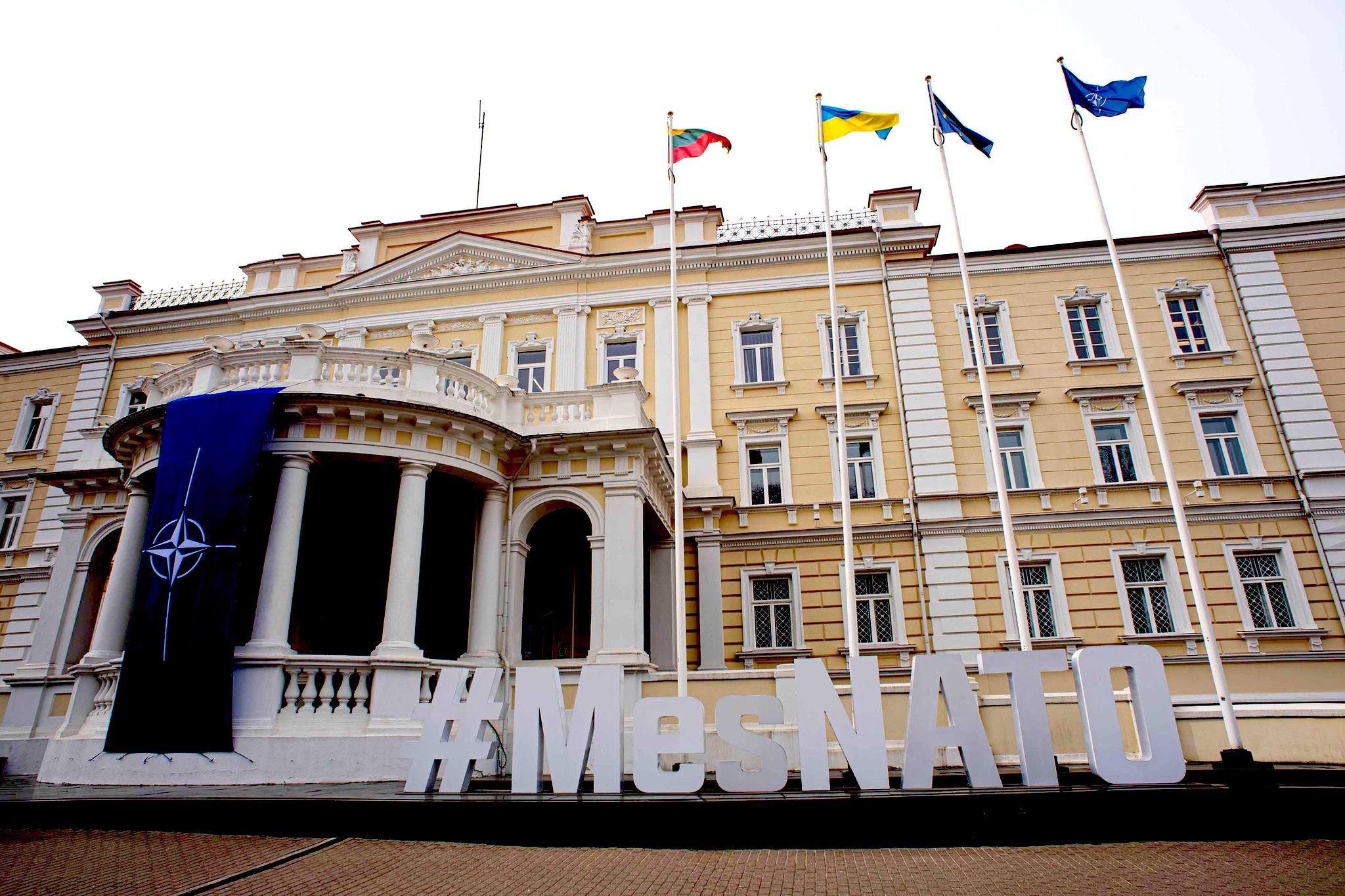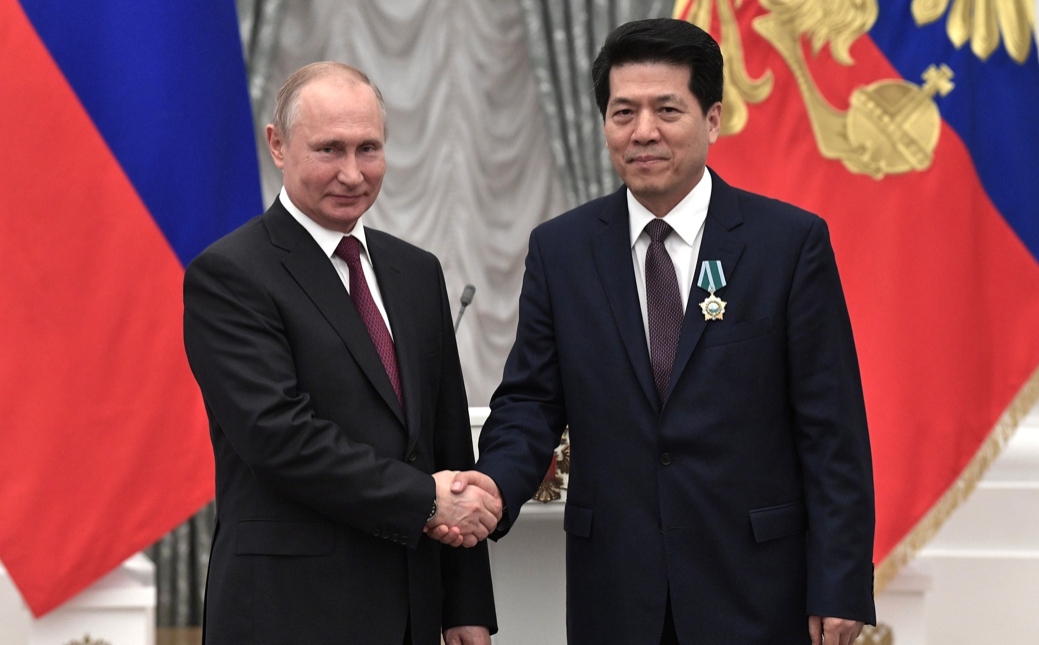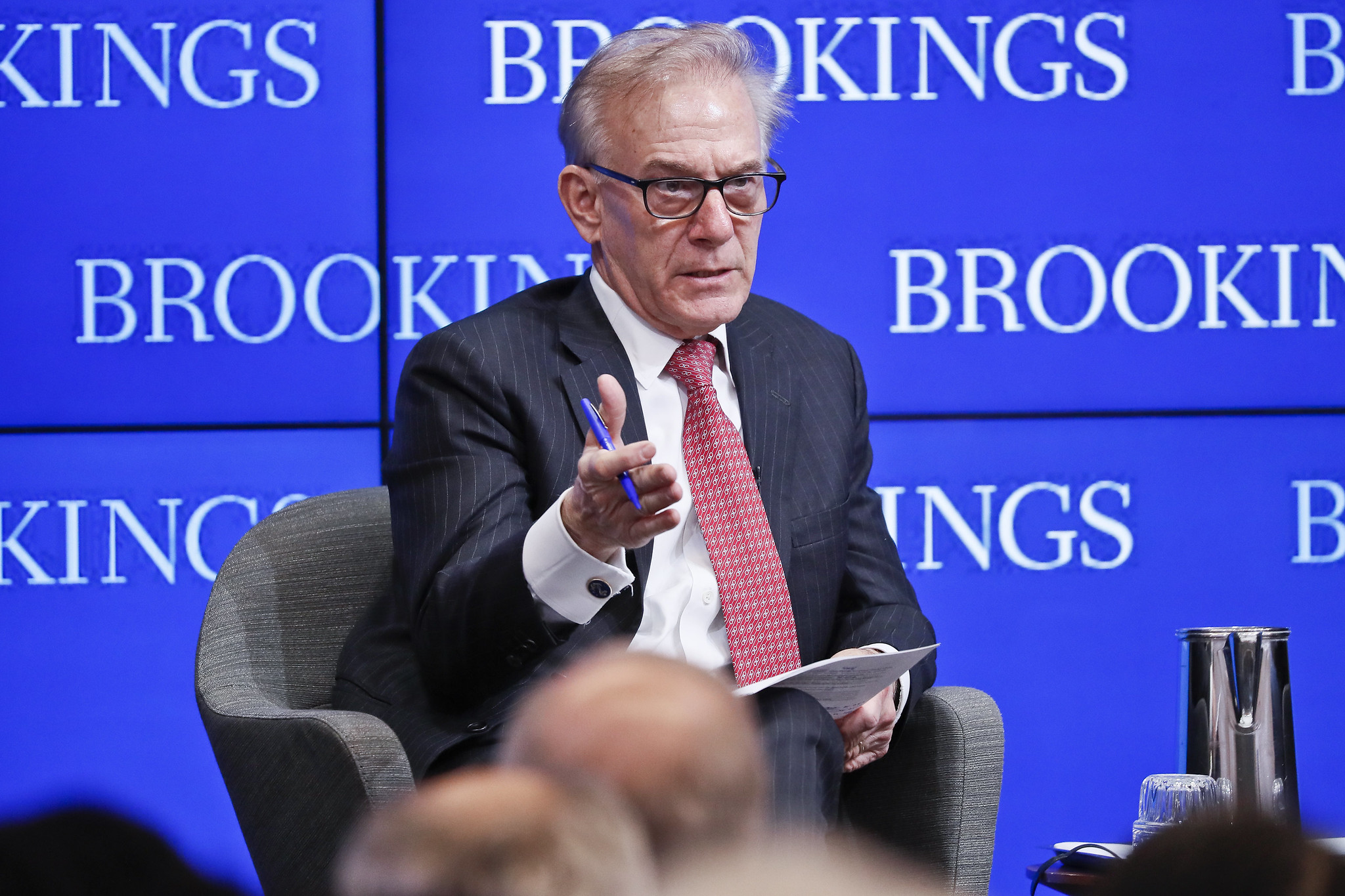Zelensky’s European tour can be seen as the run-up to the Atlantic military alliance’s meeting in Lithuania in two months, writes M.K. Bhadrakumar.

The NATO flag is installed on Lithuania’s Defense Ministry building, with a sign in front saying #WeAreNATO, April 2022. (NATO)
By M.K. Bhadrakumar
Peoples Dispatch
 President Volodymyr Zelensky’s tour of Rome, Berlin and Paris has been a success, securing for Ukraine significant additional quantities of weaponry for the upcoming offensive against Russian forces. The high water mark was Germany’s announcement of a new package of military aid worth an estimated €2.7 billion, which will be the country’s largest delivery of arms to Ukraine.
President Volodymyr Zelensky’s tour of Rome, Berlin and Paris has been a success, securing for Ukraine significant additional quantities of weaponry for the upcoming offensive against Russian forces. The high water mark was Germany’s announcement of a new package of military aid worth an estimated €2.7 billion, which will be the country’s largest delivery of arms to Ukraine.
The German package includes 30 Leopard-1 A5 main battle tanks, four new IRIS-T SLM anti-aircraft rocket launchers, dozens of armored personnel carriers and other combat vehicles, 18 self-propelled Howitzers and hundreds of unarmed recon drones.
Zelensky said important decisions on “defending Ukrainian skies” were reached during talks in Italy on Saturday. In sum, Old Europe conveyed solidarity with Zelensky at a crucial juncture when all eyes are on the so-called Ukrainian offensive being the last throw of dice.
It was another powerful day for our defense, for our international positions.
I thank Mr. President Frank-Walter Steinmeier, Mr. Chancellor Olaf Scholz @Bundeskanzler and the German ?? people for the powerful defense package, for their leadership in defending lives from Russian… pic.twitter.com/NYSDdC2u4h
— ????????? ?????????? (@ZelenskyyUa) May 14, 2023
Last week, Newsweek quoted Henry Kissinger predicting that he believes the Ukraine war is coming to a turning point and expects negotiations by the end of the year, thanks to recent efforts made by China. Kissinger said, “Now that China has entered the negotiation, it will come to a head, I think, by the end of the year. We will be talking about negotiating processes and even actual negotiations.”
Indeed, from all appearances, China has comprehensively outmaneuvered the U.S. over the Ukraine crisis. Last Friday, the Foreign Ministry spokesperson in Beijing announced that China’s special representative on Eurasian affairs, Li Hui, will visit Ukraine, Russia, Poland, France and Germany starting May 15 with the aim of discussing a “political settlement” to the Ukraine crisis. Washington was not mentioned as part of Li’s itinerary, but Beijing instead prioritized the European capitals that have urged China to play a more active role in the Ukraine situation.

Chinese diplomat Li Hui, on right, with President Vladimir Putin in Moscow in May 2019 after receiving an order of friendship. (The Kremlin)
Meanwhile, by extending a warm welcome to Zelensky, Rome, Berlin and Paris have completely ignored the Top Secret U.S. intelligence documents that have been recently leaked, which smeared the Ukrainian president as a maverick who says one thing publicly and an entirely different thing privately, who poses as moderate but in reality is an inveterate hawk escalating the war right into Russian territory, and so on. Apparently, European countries do not seem to go along with Washington’s pressure tactic against Zelensky to escalate the war despite his grave reservations regarding Ukraine’s military preparedness.
Support CN’s Spring Fund Drive
However, on a parallel track, there are also signs of Washington reviewing its earlier rejection of Chinese mediation. David Ignatius at The Washington Post, who has been plotting the shift, exudes optimism in his latest column that the 10-hour long “intense meetings” spread over May 10-11 in Vienna between U.S. National Security Advisor Jake Sullivan and China’s foreign affairs official, Wang Yi, “actually seemed to be creating a framework for constructive engagement.”
US Warming to Chinese Mediation

David Ignatius, columnist for The Washington Post, in 2019. (Brookings Institution, Flickr, CC BY-NC-ND 2.0)
Ignatius estimates that “some shared space seems to have emerged during the long, detailed discussions between Sullivan and Wang… They appear to have found a language for superpower discussion, like what once existed between the United States and both Russia and China but has been lost.”
On the other hand, Beijing has been betting that Germany, France and Italy, which prioritize the recovery and growth prospects of their economies, hope to strengthen economic relations with China to bolster their economies — and are, therefore, inclined to pursue foreign policies that are different from the comparatively extreme policies of the U.S.
Indeed, French President Emmanuel Macron announced on Friday that Chinese group XTC New Energy Materials will set up a joint venture with France’s Orano in the battery sector in the northern French port city of Dunkirk for an expected investment of $1.63 billion. The venture is expected to create around 1,700 jobs.

Orano headquarters in suburban Paris. (Mario Fourmy, CC BY-SA 4.0, Wikimedia Commons)
That said, Ignatius is an influential columnist with a long record of transmitting the U.S. establishment’s diplomatic signaling. At its most obvious level, his May 14 column highlights a high level of keenness on the part of the Biden administration to engage with China regarding Ukraine, which could have fallouts for the U.S.-China relationship.
Also, the Biden administration seems to be hoping that by engaging with China, it can create differences between Beijing and Moscow and drive a wedge into the Sino-Russian alliance. Ignatius claims that Moscow viewed with “dread” the Sullivan-Wang meeting in Vienna.
The Biden administration’s revised hypothesis is that China’s objectives and priorities in the Ukraine situation are basically at variance with the Kremlin’s and, therefore, the smart thing to do is to abandon Washington’s outright rejection of President Xi Jinping’s peace initiative on Ukraine or berate China’s support to Russia, but instead position the U.S. as a cooperative interlocutor on peacemaking and nudge Beijing to put pressure on Moscow to compromise.
Fundamentally, the assumption here is that Russia can still be isolated on the geopolitical chessboard.
But the big question remains: Is the Biden administration in a position to overcome the influential body of opinion in the U.S. that also happen to be in alliance with top officials in Ukraine’s corridors of power?
Ivo Daalder, former U.S. ambassador to NATO (in the Obama administration) and currently the president of the influential Chicago Council on Global Affairs, wrote in a hard-hitting opinion piece in Politico after a visit to Kiev that
“Putin’s strategic failure will only be complete if Moscow comes to understand that Ukraine is permanently lost — lost physically, economically, politically and strategically. And ensuring that failure should be the ultimate objective — not just for Ukraine but for the West too.”
His thesis is that the strategic case for including Ukraine in the West goes to the core of the current conflict and any alternative would only prolong the conflict and pose new security challenges for the Western alliance system. Now, how is such an integration to be achieved?
Daalder proposes:
“Even without a formal end to the war, let alone real peace, the U.S. and other NATO countries need to make clear that they’re committed to Ukraine’s security and that they will explore interim arrangements — just as they did for Finland and Sweden — until it becomes a full member.”
While the media attention is on the commencement of the so-called counteroffensive by Kiev, the locus of the Ukraine conflict is shifting to the NATO Summit on July 11-12 in Vilnius, Lithuania, which is less than two months from now, to which Zelensky has been invited.
Zelensky’s current European tour — he has been to Finland and the Netherlands also in recent weeks — can be seen as the run-up to the Vilnius summit. Simply put, the foreplay has begun. It is not the Ukrainian counteroffensive, stupid! Russia — and China — should expect some nasty surprises.
M.K. Bhadrakumar is a former diplomat. He was India’s ambassador to Uzbekistan and Turkey. Views are personal.
This article originally appeared on Indian Punchline.
The views expressed are solely those of the author and may or may not reflect those of Consortium News.
Support CN’s Spring
Fund Drive Today


This article confirms my belief that NATO’s intention in Ukraine is the destruction of Ukraine. Belarussia is next. The strategic goal is to prevent a unification of Russia, Belarussia and Ukraine, which would create a power block as great as that of modern China. That block would have dominance over much of the worlds food sources at a time when food shortages are increasing.
Not sure, but I suspect that M.K. Bhadrakumar has shone a “say what”? light on how confused, superficial, contradictory and muddy the thinking of the delusional west (G7) is.
For example, he writes above – “Ignatius is an influential columnist with a long record of transmitting the U.S. establishment’s diplomatic signaling. At its most obvious level, his May 14 column highlights a high level of keenness on the part of the Biden administration to engage with China regarding Ukraine…Also, the Biden administration seems to be hoping that by engaging with China, it can create differences between Beijing and Moscow and drive a wedge into the Sino-Russian alliance. Ignatius claims that Moscow viewed with “dread” the Sullivan-Wang meeting in Vienna.”
Does Washington have any clue how angry China must be regarding their meddling with what I’ll refer to as the “Chinese province” of Taiwan? Neither China or Russia trust the jokers in DC. Who would after all the deceit and lies and aggression and warmongering and sanctions and grabbing sovereign bank accounts and gold?
I think M.K. Bhadrakumar wrote this whole thing in jest.
Especially the delusion in DC that they can drive a wedge between China and Russia. These DC NEOCON fanatics are playing checkers – and playing it badly – while the BRICS SCO guys are playing three dimensional chess and seem to me that they are the adults in the room right now – which may just be my vain hope that they can maneuver us onto a more peaceful, sustainable path…
Brian Berletic of the New Atlas shared one more recent color revolution under the NEOCON belt:
hxxps://www.youtube.com/watch?v=5WJOFH7yNkU
That confounded me too evelyn. How anyone could think China would side with the US after all the war rhetoric and all the US bases being installed in the region and new embassies opening. Mmmmm strange.
Finally, though, the Chinese have to eat. They need the Euro & US markets. And they want the Ukraine corridor for the B & R infrastructure. So they will negotiate some temporizing arrangement on Taiwan calling for a referendum. Russia will accept something short of a new Euro security framework, but removal of missile sites from Turkey, Rumania, Poland, Lithuania and Germany, disarmament and neutrality of a rump Kievan state under constant monitoring, removal of all sanctions, and finally, US & Germany pay to repair Nord Stream.
The author appears to ignore the fact that NATO has been severely weakened by this conflict. Ukraine’s huge army that took 8 years to build up has been virtually destroyed. NATO countries have depleted their arsenals, and the west simply cannot keep pouring money and weapons into Ukraine. Sanctions have failed, and backfired badly on the collective west.
So, what surprises, short of using nuclear weapons, can NATO produce now? If anything, it will be Russia and China producing the nasty surprises.
“Is the Biden administration in a position to overcome the influential body of opinion in the U.S. that also happen to be in alliance with top officials in Ukraine’s corridors of power?”
Why would he want to? He is among them.
At a time the world urgently needs peace , progress and cooperation Washington is behaving like a loser. People have to realize endless war is a direct threat to planetary survival. Even if peace is negotiated now the consequences are going to linger on many, many years.
The hollow men are spending too much time dancing around the prickly pear.
Au contraire. I think that the US, NATO, and the EU are the ones in for nasty surprises. The Z-man has gone through 2 armies. I know that the old saw is that the third time’s the charm but Russia has the military muscle to stop Kiev in its tracks if it wants to use it.
“Simply put, the foreplay has begun. It is not the Ukrainian counteroffensive, stupid!”
Too true. And the ground war in Ukraine is not the main event in the ongoing economic war and radical rearrangement of the political and economic landscape. On the other hand “foreplay” is a rather cavalier term for what might end up as WWIII.
“Also, the Biden administration seems to be hoping that by engaging with China, it can create differences between Beijing and Moscow and drive a wedge into the Sino-Russian alliance. Ignatius claims that Moscow viewed with “dread” the Sullivan-Wang meeting in Vienna.”
With all due respect to M.K.B., I do not believe China, at this late date, will be so naive as to believe that the US is “agreement capable” or to be trusted any further than it could be thrown over one’s shoulder.
Evry aspect of the current Ukraine conflict PROVES that the US cannot be trusted, does NOT speak the truth, and will ONLY abide by any “agreement” so long as it suits its immediate needs. None of which, I’d venture to guess, is lost on Chinese leadership.
Agree with Vinnieoh and Jeff Harrison. To believe that a wedge can be driven at this point into the Sino-Soviet alliance, which has been nurtured over the last number of years and is as close as can be, is to be as delusional as the Sullivan/Blinken/Nuland neocons driving our absurd, naive and destructive foreign policy.
That’s right. The Chinese understand, as do the Russians, that the US is incapable of making agreements and can’t be trusted. But they also understand that the US is run by violent-minded idiots. I mean really now, Jake Sullivan? Tony Blinken? Joe Biden? A gang of fools and self-satisfied nincompoops. If I can see that, anybody else can too.
Mr. M.K. Bhadrakumar you and I are on a parallel universe !